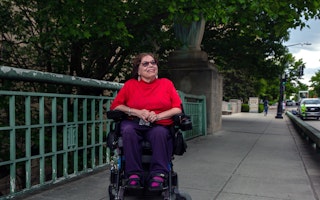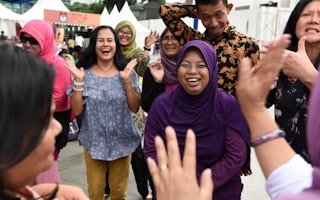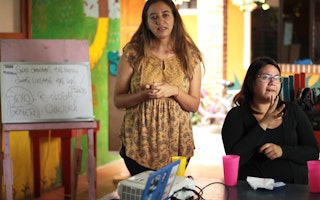Virtual, Inclusive, and Strong: How a Youth Group Brings Disability Rights Mainstream
By Kimberly O'Haver

A new, vibrant youth group has emerged in Latin America to advocate for human rights in ways not seen previously.
What makes the group, known as Movimiento Estamos Tod@s En Acción (META), unusual begins with its membership. Youth with and without disabilities collaborate across 10 countries in the region to advocate for human rights broadly—but with a particular focus on the rights of persons with disabilities.
This seamless blending of youth with and without disabilities is part of what makes META unique. The group represents “the future of the world,” according to Geannina Zuniga, a META member from Costa Rica, as it “shows no evidence of social stigma or inherited taboos,” but instead demonstrates how different people from different countries can communicate and work together.
A Postcard That Talks
A set of sign-language animated postcards developed to teach sex education showcases how this tech savvy and socially conscious youth group is making a difference.
Responding to the lack of sex education materials for deaf and hard of hearing people, META designed an application called FARST, where a narrator becomes animated and provides sex ed basics in Spanish as well as in sign language. This easy to use tool is typical of META interventions: it’s free, tech friendly, and responsive to an important need.
A Virtual Democracy
The way the group comes together to make decisions is also unusual; they’re rarely in the same room at the same time. Relying on social media platforms such as Facebook and WhatsApp, the group is able to convene members regularly from all over Latin America. A significant number of members come from Argentina, Colombia, Costa Rica, the Dominican Republic, Ecuador, Guatemala, Honduras, Mexico, Peru, and Uruguay, META organizers say.
Every META member has an equal vote in all group decisions. When META is invited to present its views at an international forum, members first meet virtually to discuss the opportunity and vote on who is best suited to deliver the group’s message. This is, for example, how the group approached its advocacy before the UN Committee of the Convention on the Rights of Persons with Disabilities in Geneva recently.
META’s roots can be traced back to 2012, when the Fundación Uruguaya de Instituto Discapacidad y Desarrollo Inclusivo, a grantee of the Open Society Foundations, participated in a debate competition in Mexico, bringing a number of competitors with disabilities. Categories of competition were not segregated between debaters with and without disabilities, so for many of the youth with disabilities, it was a unique opportunity to be fully included in such a competition.
The event also had an enormous impact on competitors without disabilities. They debated their peers, in some cases through sign language interpreters, and had no difficulty engaging with people who had speech differences. Mariana Rebollo, a META member from Uruguay, said that the experience left her with “a fuller understanding of the realities faced by others.”
“I think this has made a great contribution, because all of the people here will leave with a different mentality regarding people with disabilities,” another participant said. “They will not see a person in a wheelchair or with a cane in some weird way, because now they have seen that a person with a disability is just that, a person!”
A Strong Voice
Today, META is a strong voice promoting development policies that actively engage youth with disabilities in making decisions at local, national, and international levels.
As an agent of change, META also consciously seeks to amplify and strengthen the voices of its members. “The outcome will be [determined by] the ability of every one of us to build the society we deserve,” said Sanitago Alvarez, a member from the Dominican Republic.
“Above all,” said Angel Rodriguez, a member from Mexico, “META has allowed me to understand that inclusive development is not an issue pertaining only to persons with disabilities, but to all people.”
Movimiento Estamos Tod@s En Acción is a project of Fundación Uruguaya de Instituto Discapacidad y Desarrollo Inclusivo, a grantee of the Open Society Foundations.
Until December 2021, Kimberly O’Haver was a program officer with the Open Society Human Rights Initiative.


